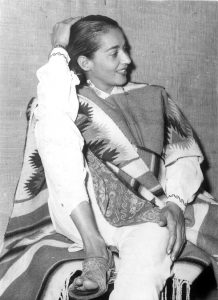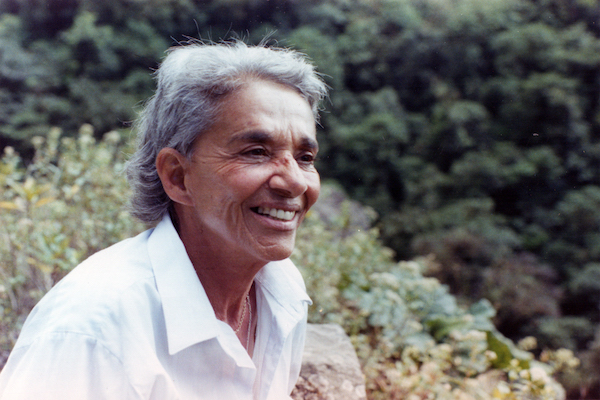By Allison Dopp
Chavela, born Isabel Vargas Lizano in Costa Rica in 1919, became a Latin Grammy award winning Mexican ranchera singer who reached what some consider her musical prime at age 71, and came out publicly a decade later. Challenging social norms of the time, in the 50s, Chavela was known for wearing pants, drinking tequila, smoking cigars and singing love songs, usually sung by men, without changing the pronouns. When Chavela died in 2012 at age 93, she left behind a musical legacy of 80 albums in her unique style, full of raw passion and deep suffering.
This daring, unapologetic artist is the subject of the film Chavela, screening at QDoc in Portland, Oregon, May 20. The film, directed by Catherine Gund and Daresha Kyi, is centered around Gund’s never-before-seen interview footage of Chavela from her conversation with a group of young lesbians in 1991.
Gund’s interview takes place just prior to Chavela’s epic comeback at age 71 after a 12-year battle with alcoholism. In the interview, Gund says Chavela is “super feisty and kind of has nothing to lose. And she’s suspicious, but she’s raw and bruised. And she’s just lost [the] love of her life, and gotten clean and sober. And to what end? She doesn’t suffer fools, you know? She’s not interested in being, you know, kind or funny or anything, and she ends up being all of those things.”

The film’s synopsis teases viewers with rumors of Chavela’s larger-than-life persona, made up of sensational legends, many of which she helped spread herself. Rumors like, did Chavela pack a pistol and sometimes shoot it off just for fun? Or have epic drinking binges with friends that started on Friday and ended the following Wednesday? After she sang at Elizabeth Taylor’s Acapulco wedding to Mike Todd, did she really leave the party with Ava Gardner? And did she bolt the moment Frida Kahlo said she loved her too, never to see her again?
Gund doesn’t promise a resolution of these tales with hard facts, but rather to demystify some of Chavela’s story and provide a glimpse into who she was in her own words. “We tried to adapt [Chavela’s] attitude and just get across a feeling so that you have a sense. You know, you don’t know if she lived with Frida [Kahlo] for a year or five years or a week, but you knew they were in love, and that’s kind of how we portray it in the film…I don’t know that there was anyone who had the full picture. We certainly didn’t. We discovered it as we went.”
For Gund, it’s important to hear the stories of our heroes and know that people can be flawed and still have contributed to our history. Their stories should be told because understanding their stories helps us to understand ourselves. “We don’t try to make her too perfect, too nice, too good. Like she’s super dark. She was an alcoholic.”
I think being able to say, here’s someone in all their complexity and they have something to teach us. And we don’t have to idealize them. We don’t have to romanticize them. We don’t have to make them fake. And we can have true, complicated, messed up, incredible people be representative of the history. Because part of her story, is this thing about her being herself…Boy she paid the price, and it’s because of her that we can live the way we do today.”
Join Gund for a Q&A following the screening of Chavela at Portland’s QDoc, Sat., May 20. For tickets, visit: http://www.queerdocfest.org/film/chavela/.
You can watch the trailer at: https://vimeo.com/202123182. For those outside of Portland, watch for Chavela screenings at upcoming festivals and select theaters.


